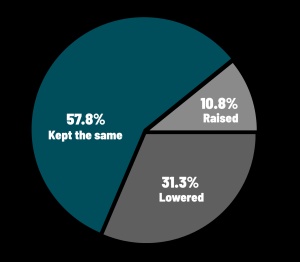
Noela Bae is currently a senior at Lynbrook High School and the Content editor of the Epic. Outside of journalism, she competes with the school's Model...
The national drinking age debate
March 29, 2019
When I turned 18 a few months ago, I felt that I was finally entering the real world — one of autonomy and responsibility. I would no longer be able to blame my naivety for my slip ups, but this problem was overshadowed by the newfound freedom and privileges I would revel in: having the right to vote, getting my hands on a personal credit card and signing my own forms and paperwork. Clearly in the eyes of the law, I was now of a mature and responsible age. Or was I?
One would think that the U.S. government would be trusting of 18-year-olds, given the many privileges that come with being 18, which even include joining the military. But the government is rather leery of 18 year-olds or too stubborn to change pre-existing laws because purchasing and consuming alcoholic beverages is not among the list of privileges granted to an 18 year-old. Philosophically, it is absurd to think that I can enlist in the military and go to war to serve my country but not be able to enter a local bar for a small glass of beer.
The drinking age was raised to 21 in the 1980s when President Reagan issued a blanket requirement for all states in an effort to curb highway-related accidents and deaths. It’s no surprise that states quickly fell into line with this act since refusal to do so would have resulted in losing 10 percent of their federal highway funding. After the law was passed, there indeed was a significant decrease in road drinking deaths, yet what many fail to take into account are the other factors that could have largely contributed to the decrease, such as tougher seatbelt and driving under the influence (DUI) laws that have been passed since that time.

Even if the 1984 law was solely responsible for reducing the number of alcohol-impaired driving crashes and deaths, the act transformed the American drinking culture for the worse. Raising the drinking age has driven the practice of drinking underground, encouraging consumption of alcohol in risky, unsupervised settings such as high school parties and fraternity houses. The lack of supervision allows underage people to get away with binge drinking, and those who get hurt from excessive consumption or other alcohol-related accidents often refuse to seek medical attention for fear of legal consequences.
Keeping the drinking age at 21 also promotes a culture of defiance among teenagers and young adults. The prohibition of alcohol for adults between the ages of 18 and 20 has glamorized drinking as a form of rebellion rather than a natural transition into adulthood, thus encouraging harmful habits fueled by curiosity. In a desperate attempt to purchase or gain access to alcohol, many have resorted to fake IDs, which not only serve as threats to national security, but also put youths on the line, exposing them to the risk of incurring serious fines or serving jail time. If the drinking age were lowered, alcohol consumption would be less taboo for adults between 18 and 20 years of age, and as a result, young adults would be less likely to drink excessively in defiance of the law. Disrespect for authority is more prevalent now than ever in the U.S., especially with all the police brutality and opposition against our president, but changing the current legal drinking age can be the first step in turning the tides.
To think that 29 percent of U.S. road traffic deaths today involve alcohol is unsettling news, but more frustrating is the fact that countries with a drinking age lower than 21, such as the U.K. and China, have lower proportions of traffic fatalities involving alcohol: 13 percent and 1 percent, respectively. Naysayers will be quick to point out that the 29 percent figure is lower than the percentage in previous years, such as the 31 percent in 2015. Nevertheless, lowering the drinking age will further prevent drinking-related fatalities, as underage drinkers will be more inclined to seek medical attention when intoxicated. The current drinking age of 21 is a relic from the 1980s that promotes dangerous alcohol abuse. It’s about time the National Minimum Drinking Age Act of 1984 be overturned once and for all.

Noela Bae is currently a senior at Lynbrook High School and the Content editor of the Epic. Outside of journalism, she competes with the school's Model...